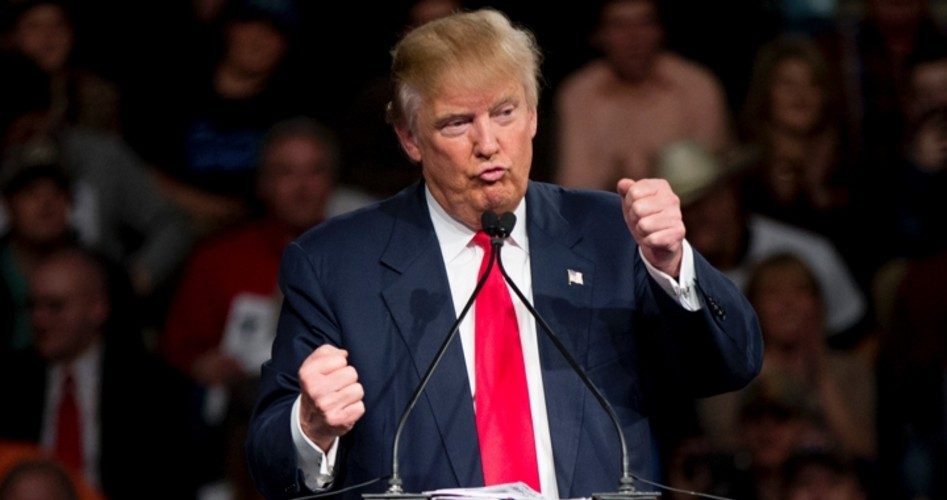
Despite his claim that he “gets along with everybody,” Republican candidate and real estate tycoon Donald Trump has a long history of either suing or threatening to sue those he asserts have wronged him in some manner. LawNewz.com has found that Trump has been involved in 169 lawsuits, dating back to 1983. He has also threatened to sue multiple times, but then failed to follow through.
So it is not surprising that Trump is now threatening to sue a fellow Republican presidential candidate — U.S. Senator Ted Cruz of Texas — claiming Cruz has lied repeatedly about Trump’s stances on various political issues. It is not unprecedented for a political candidate to charge an opponent is lying about him — who can forget Senator Bob Dole’s memorable comment to Vice President George Bush in 1988, when he said on television, “Quit lying about my record.”
Lawsuits from such accusations in a political campaign are rare, and successful defamation suits are rarer still. Since the 1964 Supreme Court decision, New York Times v. Sullivan, the bar for a public figure to actually win a libel suit is set so high that few candidates or public officials even attempt them.
But Trump told George Stephanopolous on ABC’s Good Morning America program that he might sue Cruz. “I’m thinking about it very seriously. I’ve never dealt with anybody who lies like him.”
Trump even added, “I think he’s a very unstable person.”
Trump sued his ex-wife Ivana in 1992 because she was talking about their relationship too much. He also sued Angelo Carusone for $25 million after Carusone began an online protest against the line of clothing of Trump’s carried by Macy’s Department Stores.
Reasons that individuals sue, or threaten to sue, vary. Certainly the courtroom is a place for differences to be settled in a civilized manner, if those differences cannot be worked out otherwise. Hollywood, however, often portrays the typical lawsuit as some wronged person of little means suing a giant business, or powerful institution. This leads many movie watchers to conclude that litigation is a tool most often used by the poor against the rich and powerful. The truth is that many wealthy people use litigation, and the threat of it, as a means of intimidation to get what they want.
For people with limited financial means, having a wealthier person threatening to sue them is not really a level playing field. Legal expenses — lawyer fees, depositions, court fees — can run into the thousands of dollars very quickly. Even if a defendant of limited income in a lawsuit prevails, they can be left with a debt that might take years to pay off. Businesses, both large and small, often “settle out of court” rather than take on the expense of defending against a lawsuit. But if one is a billionaire, thousands of dollars are not a major concern.
Daily Beast reporter Olivia Nuzzi explained how this applies specifically to Trump. “He sues, most of all, to make headlines and to reinforce the notion that he is powerful.”
In the case with Cruz, Trump is angry that his chief opponent for the Republican nomination has accused him of being a liberal. Among the examples Cruz has given to make his case against Trump is that Trump has used eminent domain to obtain property for his own businesses, that Trump has mentioned his own sister (a pro-choice liberal) as a potential appointee to the Supreme Court, and Trump’s many contributions to liberal Democrats over the years.
In addition to threatening a lawsuit against Cruz, Trump has also raised the specter that he might run a third-party race for president. Most pundits believe that such a run would split the Republican vote, and hand the election over to the Democrats.
Although Trump signed a pledge with the Republican National Committee (RNC) to not run third party, he is now arguing that the RNC is not keeping its part of the bargain. “The RNC better get its act together because you know, I signed a pledge, but the pledge isn’t being honored by them,” Trump told a campaign rally in South Carolina.
For his part, Cruz is saying he will not be intimidated by Trump’s threat to sue. “Donald,” Cruz said to reporters at a hotel conference room in South Carolina, “if you want to file a lawsuit challenging this ad, claiming it’s defamation, file the lawsuit.”
Cruz played the ad for a roomful of reporters, which included multiple examples of Trump espousing more liberal positions such as abortion from an interview with NBC’s Tim Russert several years ago. He also used an easel to display several campaign contributions to Democrat candidates over the years, including to such prominent Democrat politicians as Jimmy Carter, Joe Biden, Ted Kennedy, Hillary Clinton, John Kerry, and Rahm Emanuel.
Trump’s response was swift. “He is a liar and these ads and statements made by Cruz are clearly desperate moves by a guy who is tanking in the polls.” He then added that he might just bring another lawsuit asserting Cruz is not a natural born citizen, adding, “Time will tell, Teddy.”
Cruz says he is unafraid of a Trump lawsuit: “One of the things I look forward to most of all is deposing Donald Trump. And for that particular endeavor I may not use outside counsel. I may take the deposition myself. And I will say this: Whether in a deposition or in a court of law, getting Donald Trump under oath, under penalty of perjury, answering these questions? Well I’ll point out, it didn’t work out very well for Bill Clinton. Donald Trump doesn’t want to be under oath answering questions about his own record.”
Cruz presented four points, which he claimed proved his contention that Trump is pro-abortion. These included the Russert interview, in which Trump said he was pro-choice on the question of partial birth abortion; Trump’s comments that he believed his sister, a federal judge, would make an excellent Supreme Court justice (she struck down a New Jersey law against partial birth abortion); the many donations to pro-choice Democrats, going back decades; and his recent comment during the South Carolina debate that Planned Parenthood has some good programs for women.
At the end of his press conference, Cruz gave reporters copies of the letter from Trump’s lawyer, which told the Cruz campaign to stop running the ad, or they would be held “jointly and severally liable to the fullest extent of the law for any damages resulting therefrom.” They also handed the reporters the response from Cruz’s lawyer, Chris Gober. “We now plan to air the ad with greater frequency.”
Another clue to Trump’s motives could be his response to his unexpected loss in Iowa to Cruz. After initially accepting the results with unusual grace, the next day Trump began blaming his loss on the Cruz campaign’s repeating of a MSNBC report, which they interpreted as Ben Carson dropping out of the race. Trump argued that Cruz had, in effect, stolen the race in Iowa. Some pundits think Trump is preparing for an explanation that he failed to get the nomination because Cruz and the RNC stole the nomination from him. (This would be rather surprising, since Cruz is also accused by Trump of not being liked by any of his fellow Republicans).
While Trump is presently projected to win the South Carolina primary, and go on and win the Republican nomination (at least by many political pundits), if he were to be denied the nomination, other pundits are predicting he would refuse to endorse the eventual winner. Some Republicans fear that Trump’s opposition to a Republican nominee could sink the party’s chances in November.
Photo: AP Images

